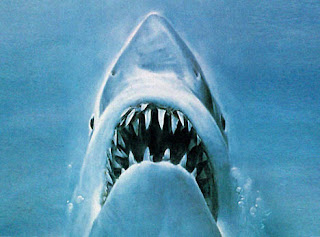All is well. My training is coming along if ever so slowly. I must constantly keep reminding myself you don't get injured over night and you certainly don't regain your fitness back that quickly either. I'm anxiously awaiting my big ocean adventure scheduled for next weekend in York Maine. I just printed out the race packet and you'd a though I was doing an Ironman with all the printed pages in the packet of logistics and such. I made the mistake of reading the packet right before going to bed after printing it out. BIG MISTAKE. My eyes were like saucers when I flipped off the light. Here's a bit of the race packet info I've been milling over.
1. There will be four buoys located on the course and one just before the finish. Swimmers must stay to the right of all buoys. Now call me spoiled by triathlon 1.2 mile swims, but I distinctly remember many more buoys to sight off of then 4. And where's my big blow up arch I want to run through at the finish??
2. Be aware there will be lobster buoys scattered throughout the race course. Swimmers are not to hang onto them or disturb them in any way. I think it's pretty safe to say, I won't be diddling along the course looking for lobster buoys to hang on to. Now mistaking them for a race buoy, THAT is another ball of wax.
3. Hypothermia: Hypothermia is a medical condition that occurs when the core temperature of the body drops below 35 degrees C, (95 degrees F). Swimmers are particularly vulnerable to hypothermia when swimming in cold water. Individuals that are the most susceptible are those people without much body fat, especially slender males. The risk of hypothermia increases when fatigue occurs during swimming. The amount of time spent in the water is also a significant risk factor for hypothermia. That is, the longer the amount of time spent in the water, the higher the risk. Water temperature above 60 degrees is usually not a problem for the swimmer. However factors such as strong water current may increase the risk.
The keys to hypothermia include: uncontrollable shivering, stiff muscles, numbness in extremities, extreme fatigue.
4.Swimmers are encouraged to avoid the shoreline and any rock formations.
No comment.
And lastly, you just can't make this up people. Today on my Comcast Home page:
Boaters told to be alert for sharks off Northeast
"experts believe more will return this summer, attracted by the exploding local population of seals, a favorite shark food." Ok, so lets play the association game. Wetsuit/ shark food
Wetsuit/seal. Wetsuit/shark chum
Wetsuit/seal. Wetsuit/shark chum
"sharks in the ocean waters off the Northeast, warning that the creatures could easily capsize a small boat or kayak" I'd say my theory of having the non required kayak escort with me to beat off any potential flesh-eating fish with his or her paddle just went swirling down the toilet.
"officials held a news conference this week to stress that no great whites — the kind of shark that taunted swimmers in the book and movie "Jaws" — had been spotted near beaches, and that beachgoers and swimmers should not be worried so long as they exercise "common sense" and avoid swimming near seals." This can't possibly apply to dressing up like a seal and trashing around in the water with 100 other seal-like human. No..... yes!!!!! No... YES!!! NO YEEEEES!!

3 comments:
Ohhhh...I am totally scared of sharks! I like that the news article specifically called out the fact that Great White sharks are not around, that would make me feel even less assured ;-)
Just find someone who you can out sprint and stick with them.
Seriously, have a great swim! I can't wait to hear about it. All things aside, it sounds really cool.
The warning about the sharks are all over the news! But as I learned this morning, you are 30 times more likely to be hit by lightening than attacked by a shark. Enjoy your swim and I think it is funny that you have to watch out for the lobster buoys.
Yikes.
Just spray paint your wetsuit bright green and you'll be fine! (maybe...)
Post a Comment